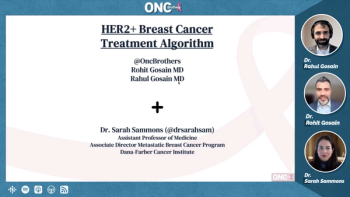
Risk of Breast Cancer in Latinas May Be Due to Subtype-Specific Genetic Risk Variants
This study observed a positive association between Indigenous American genetic ancestry and HER2-positive breast cancer, suggesting that the high incidence of HER2-positive subtypes in Latinas may be due to population and subtype-specific genetic risk variants.
A study published in Cancer Research found a positive association between Indigenous American genetic ancestry and HER2-positive breast cancer, suggesting that the high incidence of HER2-positive subtypes in Latinas may be due to population and subtype-specific genetic risk variants.
"The risk of breast cancer-related mortality varies between different populations, with Latina women having a greater risk of breast cancer-specific mortality than non-Hispanic white women," Laura Fejerman, PhD, associate professor of medicine at the University of California San Francisco, said in a press release. "Latina women tend to be diagnosed with more aggressive breast cancer subtypes, which may contribute to their greater risk of mortality, among other factors.”
Previous findings from Fejerman and her colleagues indicated that Indigenous American ancestry was associated with a lower incidence of breast cancer. However, the influence on various breast cancer subtypes remained unclear.
Another prior study examined a small cohort of Colombian patients with breast cancer and suggested that a higher proportion of IA ancestry was correlated with increased expression of the ERBB2 gene. This led Fejerman and her colleagues to assess whether Indigenous American ancestry could be associated with risk of HER2-positive breast cancer.
The study, titled the Peruvian Genetics and Genomics of Breast Cancer study (PEGEN-BC), used genome-wide genotype data for 1,312 patients from the Instituto de Enfermedades Neoplásicas (INEN) in Lima, Peru to estimate genetic ancestry. Researchers tested the association between HER2 status and genetic ancestry using logistic and multinomial logistic regression models.
Overall, average Indigenous American ancestry was found to differ by subtype and HER2-positive breast cancers accounted for 30% of cases (18% were positive for hormone receptors). On average, the participants had approximately 76% Indigenous American ancestry, with 9.8% having greater than 95% Indigenous American ancestry.
In multivariate models, the odds of having an HER2-positive tumor increased by a factor of 1.20 with every 10% increase in IA ancestry proportion (95% CI, 1.07-1.35; P = 0.001). However, the odds of developing HER2-positive disease decreased with increasing European ancestry. This observation was independent of the participant's age at diagnosis, level of African ancestry, height, tumor stage at diagnosis, and region of residence.
The findings were then independently replicated in 616 samples from Mexico and Colombia. The odds of having a HER2-positive tumor in these cohorts was approximately 1.28 times greater for every 10% increase in IA ancestry. These results suggest that the high prevalence of HER2-positive tumors in Latinas could be due, in part, to the presence of population-specific genetic variants affecting HER2 expression in breast cancer, according to the researchers.
"Even though humans are mostly the same, there are differences between populations that affect disease risk and outcome," Fejerman said. "This study highlights the importance of studying diverse populations and collaborating with other countries. We need to understand diverse populations so that we may someday be able to provide precision cancer prevention and care to everyone, and not just a subset of the population."
Notably, the study did not include healthy controls and lacked certain epidemiological data and information about environmental exposures of lifestyle behaviors, precluding the analysis of all possible factors.
Fejerman indicated that ongoing research aims to identify specific germline variants that may lead to the associations identified in this study. Additionally, she suggested that the information presented in this study could eventually be used to create a risk prediction model for Latina women to identify those at high risk for certain breast cancer subtypes.
References:
1. Marker KM, Zavala VA, Vidaurre T, et al. Human Epidermal Growth Factor Receptor 2-Positive Breast Cancer Is Associated with Indigenous American Ancestry in Latin American Women. Cancer Research. doi:10.1158/0008-5472.CAN-19-3659.
2. Indigenous American ancestry may be associate with HER2-positive breast cancer [news release]. Philadelphia. Published April 3, 2020. eurekalert.org/pub_releases/2020-04/aafc-iaa040120.php. Accessed April 13, 2020.
Newsletter
Stay up to date on recent advances in the multidisciplinary approach to cancer.


































